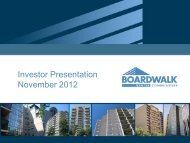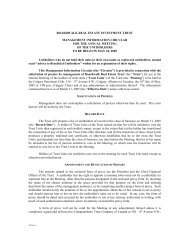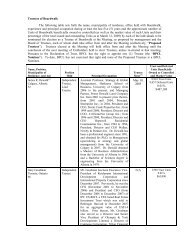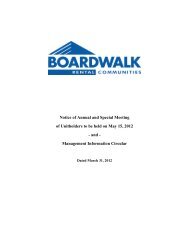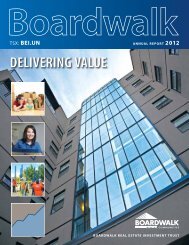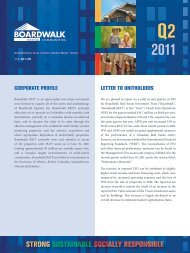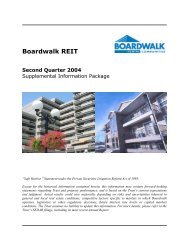BMO Financial Group - Outlook 2005(1.1Mb pdf File) - Boardwalk REIT
BMO Financial Group - Outlook 2005(1.1Mb pdf File) - Boardwalk REIT
BMO Financial Group - Outlook 2005(1.1Mb pdf File) - Boardwalk REIT
Create successful ePaper yourself
Turn your PDF publications into a flip-book with our unique Google optimized e-Paper software.
8<br />
US GDP Detail<br />
US GDP Detail<br />
2003 2004 <strong>2005</strong><br />
Q4/Q4 % Change<br />
GDP 4.4 3.9 3.6<br />
Consumer expenditure 3.8 3.4 3.0<br />
Government expenditure 2.2 2.6 1.5<br />
Residential construction 12.0 8.5 -8.8<br />
Business investment 9.4 7.8 9.4<br />
Non-res. Construction 1.5 1.7 3.6<br />
Equipment & software 12.1 9.8 11.4<br />
Imports 4.9 8.7 5.2<br />
Exports 6.1 6.7 12.2<br />
Levels- Annual (A), Q4 (Q)<br />
Ch. in inventories (00US$bn,Q) 8.6 42.0 35.0<br />
Housing starts (mn of units,A) 1.853 1.914 1.665<br />
Current account bal. (US$bn,A) -530.7 -632.1 -586.3<br />
to January 2004, the dollar firmed up through<br />
the spring and summer. Faster economic<br />
growth and narrowing rate spreads between<br />
the US and several other countries, most<br />
notably the Euro-zone and Canada,<br />
underpinned the greenback. More recently,<br />
however, doubts about the durability of the US<br />
expansion in the face of rising oil prices have<br />
kept the dollar on the defensive.<br />
…but its long-run prospects look bleak<br />
Movements in rate spreads will largely<br />
determine the greenback’s near-term<br />
performance. Rising US interest rates should<br />
underpin the dollar until the spring of <strong>2005</strong>, at<br />
which time the Fed’s expected hiatus will have<br />
the opposite effect.<br />
A more significant influence over the longer<br />
term is the growing US external debt. In the<br />
second quarter of 2004, the nation racked up a<br />
record shortfall in its current account equal to<br />
5.7% of nominal GDP. To finance the gap<br />
between domestic investment and savings, the<br />
US relies on a steady inflow of foreign capital.<br />
While net external debt – at 22% of GDP in<br />
2003 – is far from alarming, it is projected to<br />
expand to 36% of GDP by 2008. To stabilize<br />
this trend, the dollar must depreciate further,<br />
likely by 10 to 15 per cent on a broad tradeweighted<br />
basis. Because it has already fallen<br />
significantly against most of the major industrial<br />
currencies, the next stage of adjustment will<br />
mostly likely occur against the currencies of<br />
emerging nations.<br />
Economic risks appear balanced<br />
With the recovery on solid ground, the risk of a<br />
significant slowdown appears small – barring a<br />
negative shock. Of prominent concern is that<br />
crude oil prices might remain near current<br />
record highs, or worse, head higher. Should<br />
prices remain around $52 a barrel, economic<br />
growth could downshift a further one-half<br />
percentage point in <strong>2005</strong>, on a fourth quarterover-fourth<br />
quarter basis, relative to our current<br />
forecast. This would likely keep the Fed<br />
sidelined until well into <strong>2005</strong>. As well, a<br />
terrorist attack in the US could destabilize<br />
business sentiment and the recovery. In this<br />
event, the Fed might need to reverse course<br />
and lower rates temporarily to shore up<br />
confidence.<br />
One possible upside risk to our growth outlook<br />
for <strong>2005</strong> derives from the Fed’s go-slow<br />
approach to policy renormalization. In the past,<br />
this tactic has run the risk of the economy<br />
growing too rapidly and overshooting its<br />
capacity limits. Should this occur, the Fed<br />
would need to boost rates aggressively, which<br />
would lead to a sharper economic slowdown in<br />
2006.<br />
Sal Guatieri, Senior Economist<br />
416-867-5258<br />
sal.guatieri@bmo.com





